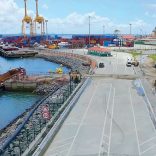Mozambique: Government publishes Maputo port concession contract, more to come
Resumption of IMF support “a lesser evil” – Mozambican economists

File photo: Lusa
The Mozambican Association of Economists (AMECON) on Monday called the resumption of financial assistance to Mozambique from the International Monetary Fund “a lesser evil”, advocating “caution”, since the IMF financing will increase indebtedness.
The IMF announced last month that it had reached an agreement with Mozambique to implement an Extended Credit Facility (ECF) until 2025, disbursing financial aid for the first time since the so-called hidden debt scandal.
“The IMF team reached a staff-level agreement with the authorities of Mozambique on a three-year program supported by an arrangement under the ECF in the amount of about SDR 341 million or $470 million”, announced Álvaro Piris, leader of the IMF mission.
Speaking to Lusa on Monday, Pedro Cossa, president of AMECON, described the organisation’s financing as “a lesser evil”, noting that it will imply more indebtedness, but under more favourable conditions than those offered by other creditors.
“I say it’s a lesser evil, but see no reason for much enthusiasm, despite having to turn to the IMF, given the facilities that the IMF offers” in its financing, Cossa declared.
The other advantage, he continued, is the sign of trust, as the institution’s reputation encourages other partners and investors to likewise believe in Mozambique.
“This sign can also bring in support,” Cossa observed.
The economist emphasised that the country needs to continue mobilising internal resources to finance the economy, through the expansion of the tax base, thereby reducing its vulnerability to the uncertainties of external flows.
“With the closure of external sources of financing, the country turned to the domestic market, and we saw a growing domestic capital market,” he stressed, while conceding that resorting to external indebtedness is “inevitable” in the domestic economy’s current circumstances.
The IMF was one of several international partners that suspended financial aid to Mozambique following the disclosure, in 2016, of borrowing by public companies that had not been reported either to the country’s parliament or to international donors.












Leave a Reply
Be the First to Comment!
You must be logged in to post a comment.
You must be logged in to post a comment.